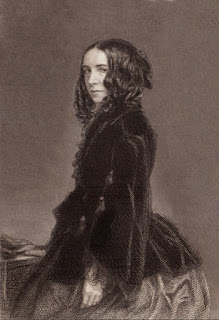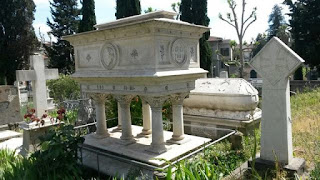But She Slept –
Her Bed – a funneled Stone –
With Nosegays at the Head and Foot –
That Travellers – had thrown –
Who went to thank Her –
But She Slept –
'Twas Short – to cross the Sea –
To look upon Her like – alive –
But turning back – 'twas slow –
FR637 (1863) J363
 Dickinson scholars claim this is another poem written in memory of Elizabeth Barrett Browning who died in Florence in 1861, just a couple of years before this poem. While it has some charm, I don't think this poem is nearly as good as the beautiful ode (Fr627) Dickinson wrote earlier in 1863 – "I think I was enchanted". I can't say it is better or worse than the other, (Fr600 – "Her – last Poems") because while both have their attractions, neither are among Dickinson's better works.
Dickinson scholars claim this is another poem written in memory of Elizabeth Barrett Browning who died in Florence in 1861, just a couple of years before this poem. While it has some charm, I don't think this poem is nearly as good as the beautiful ode (Fr627) Dickinson wrote earlier in 1863 – "I think I was enchanted". I can't say it is better or worse than the other, (Fr600 – "Her – last Poems") because while both have their attractions, neither are among Dickinson's better works.The repetitions in the first and second lines of both stanzas are lulling but seem a bit flat to me. Both the speaker and other travellers go to Florence to pay tribute to Barrett-Browning's poetry but find only that 'She Slept'. The idea and phrasing seem fairly conventional. I do appreciate, however, the spondee and sibiliant 's' and 'sh' sounds of the line. They are softly, even sadly, ponderous. They remind us that the dead receive no thanks; it is best, then, to make our pilgrimage while the person is alive.
The nosegays left by admirers are another rather conventional detail. I'd like to say the last three lines redeem the poem with their additional sibilance and the contrast between how much more quickly went the journey to the tomb to stand and visualize the dead poet as if she were alive, than the return journey, but again, the notion is not that novel; the language not that fresh.
 I was reading about EBB's famous and rather magnificent tomb as I embarked on the study of this poem, and the story of that is perhaps more interesting than the poem itself. I was initially startled by Dickinson's depiction of the tomb as being a bed of 'funneled Stone' as if it were a simple rock slab rather than the iconic sarcophagus that memorializes Barrett-Browning. But as it turns out, the sarcophagus, designed by Frederick, Lord Leighton, was not finished when Dickinson wrote her poem. So perhaps there was a more simple grave enhanced only by those tossed bouquets.
I was reading about EBB's famous and rather magnificent tomb as I embarked on the study of this poem, and the story of that is perhaps more interesting than the poem itself. I was initially startled by Dickinson's depiction of the tomb as being a bed of 'funneled Stone' as if it were a simple rock slab rather than the iconic sarcophagus that memorializes Barrett-Browning. But as it turns out, the sarcophagus, designed by Frederick, Lord Leighton, was not finished when Dickinson wrote her poem. So perhaps there was a more simple grave enhanced only by those tossed bouquets.There's quite a bit of story involved in the tomb: Leighton's designs were not followed, what should have been a portrait in the central medallion was altered by the contracted sculpture beyond recognition, and people kept taking things from the grave. EBB's name is not there, just 'E+B+B'. Robert Browning never went to visit it.
On this excellent website you can read all about it –and see the difference between Leighton's sketched portrait and what the sculptor created in its stead – ostensibly to improve it.

